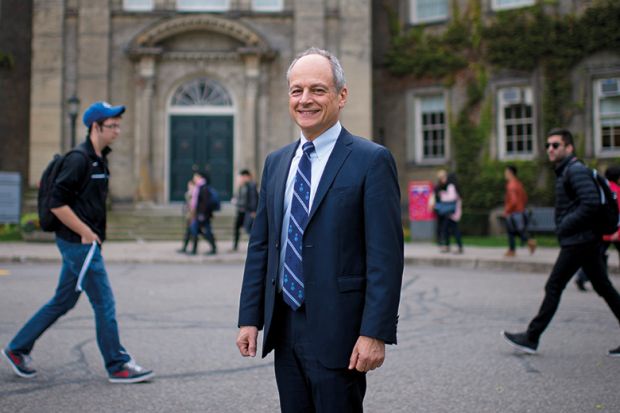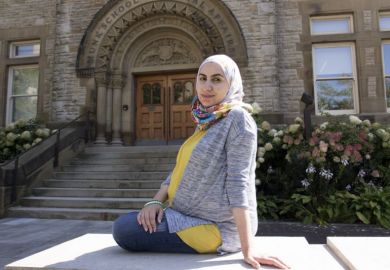As an expert on cities, Meric Gertler does not need to be told how fortunate he is to head a university that is located in such a dynamic and diverse place as Toronto.
But when he became president of the University of Toronto in 2013, he “made the case to the rest of the university”.
“The point was that we should recognise this advantage and that we should leverage it more systematically and more intentionally than we ever have before,” he told Times Higher Education.
One major benefit is that the city’s high quality of life helps the institution to attract and retain leading academics and students from across the country and the world.
Last month, the university provided an extra incentive for international PhD students to come to Toronto: it reduced their tuition fees to the same level as that of domestic students.
It means that from autumn 2018, overseas PhD students at the university will pay about C$6,000 (£3,443) per year of study that is not already funded by the university, down from about C$21,000. Typically, PhD students have to cover tuition in their final year or two years after their guaranteed funding has been exhausted, Professor Gertler said.
Although the move was implemented to “send a signal globally that the University of Toronto welcomes leading talent in all kinds of different fields”, it came about in part as a result of negotiations with Ontario’s provincial government.
The province agreed to allow Toronto to use some of the grant that it provides to support domestic PhD students for the purpose of supporting international PhD students, on the condition that any student receiving provincial funding be charged domestic fees.
The grant provides funding to support about 15 per cent of Toronto’s total doctoral enrolment, but the university decided to extend the domestic-level fees to all doctoral students, Professor Gertler said.
“Our goal will be to see the proportion of total PhD enrolment that is accounted for by international PhD students increase over time,” he said.
Although the share of overseas PhD students has dropped to about 19 per cent of total enrolment, the institution hopes that this will “rise through the 20s, even up to 30 per cent or more”, he added.
Professor Gertler’s urban theory research background also enables the university to work more closely with the city in solving shared challenges in ways that former university leaders might have overlooked.
In 2015, the university began a study in partnership with the three other higher education institutions in the city – York University, Ryerson University and OCAD University – as well as local transport planning agencies to research the daily commuting experiences and patterns of their 180,000 students, most of whom live away from the campuses.
The study, conducted by a team of faculty and students from the four universities, is already informing the transport agencies’ decisions, Professor Gertler said.
“We knew absolutely nothing in statistical terms of things like how long the average student has to commute every day and what modes of transportation they use. And moreover, the transportation planning agencies had no data on this, either. So this was a need that was invisible and that was not really being acknowledged or met by planning authorities,” he explained.
The early success of the project has led the universities to conduct a second study to collect data on affordable housing for students, with a view to proposing some “creative solutions” to address the problem.
But the University of Toronto is also having to tackle wider challenges that are confronting universities nationwide.
While Canada stands out among international higher education powers for its openness, it is struggling to compete in other areas, such as initial salary packages for new academics, Professor Gertler said.
“We’ve been doing our best to be competitive, but countries such as China have been pouring huge amounts of money into attracting scientific talent back to China or to China in the first place,” he said. “It’s not just the Chinese. Germany has been very strategic in this regard. And other European countries are also investing big time.”
The long-term decline in federal support for universities was a key gripe covered in last year’s government-commissioned Naylor report, which called for a major increase in funding for basic research and a review of the support for early career researchers.
Professor Gertler said that the “scientific community across the country will be watching carefully” to see whether the funding recommendations are implemented in the government’s budget announcement next month, but “expectations are high”, particularly given that there has been wide support for the proposals across the academic community and beyond.
“I don’t recall a time when we’ve seen such a high degree of consensus across the country in support of recommendations like this,” he said.
Register to continue
Why register?
- Registration is free and only takes a moment
- Once registered, you can read 3 articles a month
- Sign up for our newsletter
Subscribe
Or subscribe for unlimited access to:
- Unlimited access to news, views, insights & reviews
- Digital editions
- Digital access to THE’s university and college rankings analysis
Already registered or a current subscriber?








